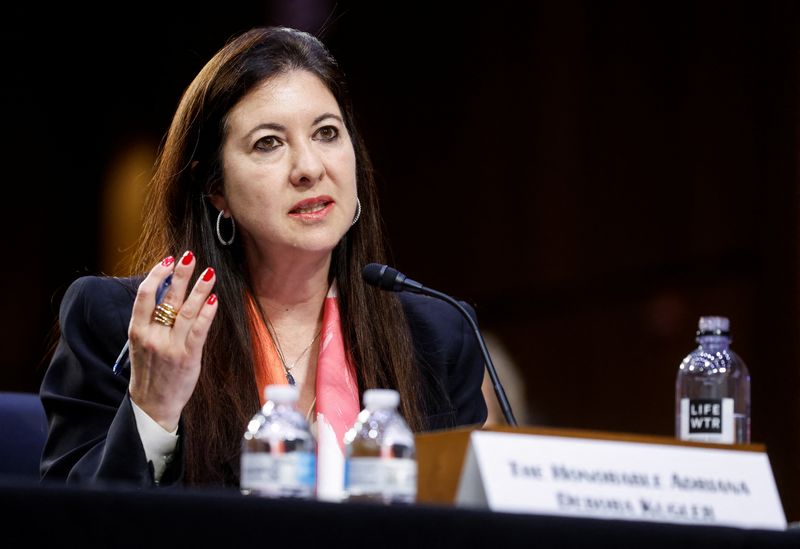“Encouraged” by recent data, Fed’s Kugler eyes rate cut later this year
2024.06.18 13:26
By Dan Burns and Ann Saphir
(Reuters) – Inflation is exhibiting encouraging signs of cooling, U.S. Federal Reserve Governor Adriana Kugler said on Tuesday, and although it is still too high, as long as economic conditions continue moving in “the right direction” it will be appropriate to cut interest rates later this year.
While more progress is required on moving inflation back to the Fed’s 2% target, “I believe economic conditions are moving in the right direction,” Kugler said in the prepared text of a speech titled “Some Reasons for Optimism about Inflation.”
“If the economy evolves as I am expecting, it will likely become appropriate to begin easing policy sometime later this year,” said Kugler, who described the Fed’s current interest rate setting as “sufficiently restrictive” to cool activity and lower inflation.
Her comments were her first public remarks since last week’s Fed policy meeting, when the central bank kept its benchmark interest rate in the 5.25%-5.50% range. The Fed also released updated economic projections that showed its officials had pared back their expectations for rate cuts this year, to one from the three seen in March, after stronger-than-expected inflation data in the first months of 2024.
Most analysts equate fewer rate cuts with a later start to them, particularly after Fed Chair Jerome Powell said the first rate cut will be “consequential” because it could reset market expectations.
“As I stand here today, inflation remains too high, but I am encouraged by the overall progress and trajectory. Recent data on the economy and inflation also give me cautious optimism that we are on track and making continued headway” toward the Fed’s 2% inflation goal, said Kugler, who last spoke publicly about the economic and policy outlook more than two months ago.
“That progress may have paused in the first three months of the year, but information since then on economic activity, the labor market, and inflation points to renewed progress.”
Kugler cited several factors about inflation that are supporting her optimism, including indications of smaller price markups, less frequent price changes, stable inflation expectations and anecdotes from businesses that price increases are becoming harder to push through as consumers become more price sensitive and exhibit “trading down” behavior.
“These various indicators – markups, price adjustment frequency, inflation expectations, and anecdotes from a range of sources – suggest that, on balance, price-setting behavior is likely to continue to move closer to consistency with the (Federal Open Market Committee’s) inflation target,” she said.
To that she added optimism that productivity may continue to improve thanks to the wave of new business formations and the push by firms to invest in artificial intelligence capabilities.

Demand is also showing signs of softening, she said, noting that the weaker-than-expected retail sales report for May published earlier on Tuesday “may be another signal that the long-expected deceleration in consumer spending may finally be upon us.”
The labor market is also moving into better balance, she noted.








